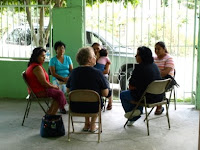
If there's ever been a mismatch, it was the union of Nabal and Abigail (
1 Samuel 25). You can almost see the announcement: “Stupid, stubborn, surly skinflint marries brainy, brave, benevolent beauty”. It's as if the characters of Folly and Wisdom stepped out of the pages of Proverbs and got hitched. Those TV advertisements with the clever wife rolling her eyes over her bumbling husband have nothing on this!
What can we learn from their ill-fated union? How can I be Wisdom rather than Folly? And what do I do if I'm Wisdom married to Folly?
Let's start with the Fool. His name, ‘Nabal’, means fool. In case we miss the point, we're told (by his wife, no less!) “as his name is, so is he. Nabal is his name, and folly is with him“ (
25:25). His is an
Isaiah 32:6 personality typing:
For the fool speaks folly,
and his heart is busy with iniquity,
to practice ungodliness,
to utter error concerning the LORD,
to leave the craving of the hungry unsatisfied,
and to deprive the thirsty of drink.
Nabal is the ridiculously wealthy owner of “three thousand sheep and a thousand goats” (
1 Sam 25:2), yet he refuses David's request to feed his 600 hungry men, even though they protected his flocks in the wilderness and it's a time of feasting. Oblivious to the fact that David's band of far-from-merry men are about to kill him, he stuffs his face with a “a feast in his house, like the feast of a king”, his heart “merry within him, for he was very drunk” (
25:36). All the threads of evil in 1 Samuel merge in Nabal: he is ‘worthless’ like the sons of Eli (
2:12), arrogant like the rich in Hannah's song (
2:3-8), and power-hungry like King Saul. He's doomed.

What about Wisdom? She matches her actions to the demands of the moment. When her servants tell her David's men are coming to murder the men of her household, Abigail loads some donkeys with a small snack from her pantry—“two hundred loaves and two skins of wine and five sheep … and five seahs of parched grain and a hundred clusters of raisins and two hundred cakes of figs”—saddles up her donkey, and gallops off (can you gallop on a donkey?). There's a tense moment as she rides into a ravine and finds hundreds of armed, angry men descending it. Leaping off her donkey, casting herself at David's feet, she begs him not to bring blood-guilt on himself by taking revenge on her fool of a husband. Wisdom receives its reward when she wins David's heart.
Folly and Wisdom indeed. But it's not just qualities like godlessness and generosity that set Nabal and Abigail apart; ultimately, it's their attitude to David. Nabal doesn't just feast like Saul, he thinks like Saul:
Who is David? Who is the son of Jesse? There are many servants these days who are breaking away from their masters. Shall I take my bread and my water and my meat that I have killed for my shearers and give it to men who come from I do not know where? (25:10-11 cf 17:55, 22:7-8)

Nabal sees David as a nobody, a rebellious servant, and pretends to have never heard of him, although all Israel knows his name (
18:16, 30). But Abigail sees beyond the desert wanderer to God's anointed, victorious king:
For the LORD will certainly make my lord a sure house, because my lord is fighting the battles of the LORD … And when the LORD has done to my lord according to all the good that he has spoken concerning you and has appointed you prince over Israel … then remember your servant. (25:28-31)
It's a statement of astounding faith. Besides Samuel, only two insignificant women discern the truth about David. Hannah was the first to speak of God's coming king (
2:10); Abigail, the first to predict his ‘lasting dynasty’ (
25:28 NIV). No-one else would foresee this until Nathan prophesied of King David that God would “establish the throne of his kingdom forever” (
2 Sam 7:13)—a promise fulfilled in Jesus Christ.

What about us? What do we do if, like Abigail, we are Wisdom married to Folly? For wives, there's a time when submission to our husband must be laid aside:* when it conflicts with our greater submission to God's anointed king (
Eph 5:22-33). A husband who's violent to children, who encourages us to lie or cheat, who doesn't pray much (so why should we?)—above all, a husband who rejects Jesus—there are times when we need the courage and wisdom of Abigail, to protect our children, to disobey when this means not sinning, to stay faithful but take a different path (
1 Peter 3:1-7): to choose wisdom, not folly.
Which will we choose? Will we choose stupidity or shrewdness, cowardice or courage, greed or goodness? More importantly, what attitude will we have to God's chosen king? Folly sees God's anointed as a nobody, to be mocked, ignored and mistreated. Wisdom perceives in God's anointed, the humble and crucified Christ, the very power and wisdom of God:
Where is the one who is wise? … Where is the debater of this age? Has not God made foolish the wisdom of the world? For since, in the wisdom of God, the world did not know God through wisdom, it pleased God through the folly of what we preach to save those who believe. For Jews demand signs and Greeks seek wisdom, but we preach Christ crucified, a stumbling block to Jews and folly to Gentiles, but to those who are called, both Jews and Greeks, Christ the power of God and the wisdom of God. (1 Cor 1:20-25 cf Ps 2, Col 2:2-3).
This is wisdom: to see in Jesus the hidden wisdom and knowledge of God (
Col 2:2-3).
* What exactly do I mean by this? I discuss it with Claire Smith in the comments at Sola Panel.This article first appeared in Sola Panel yesterday.
images are from journal of Shalom; Salim Photography; unknown; and kissabug at flickr
 Have you ever done a Myers Briggs personality test? In the very first post I wrote for this blog, I shared the profoundly important discovery that I'm an INFJ.
Have you ever done a Myers Briggs personality test? In the very first post I wrote for this blog, I shared the profoundly important discovery that I'm an INFJ.
































